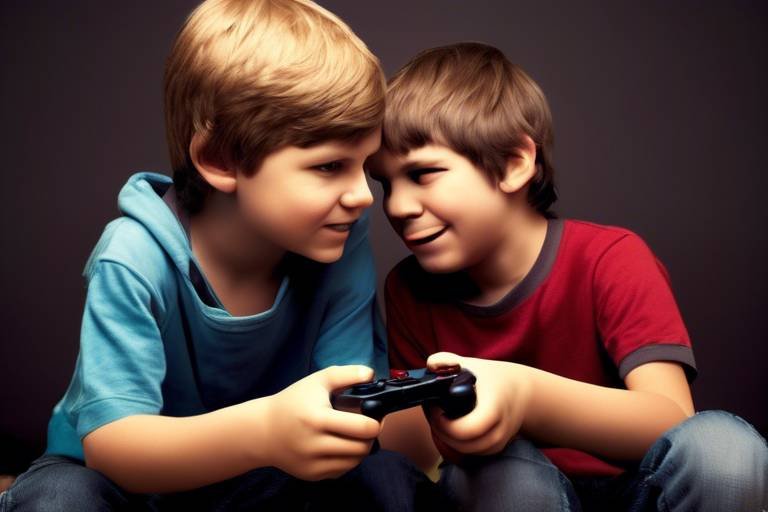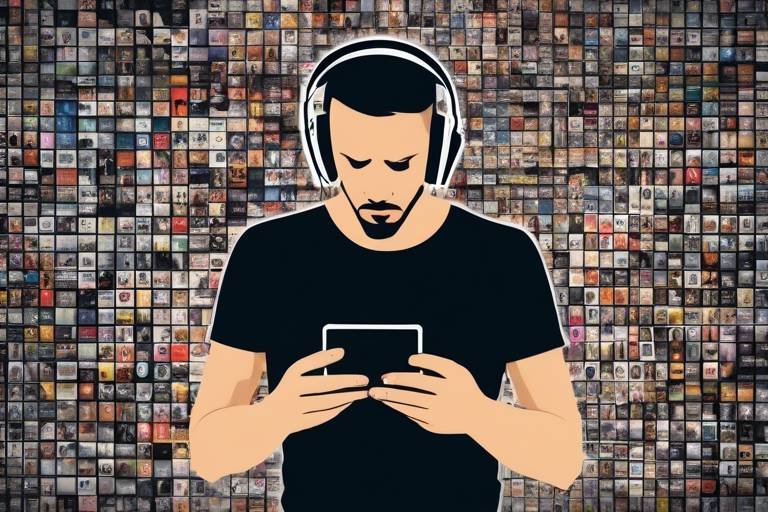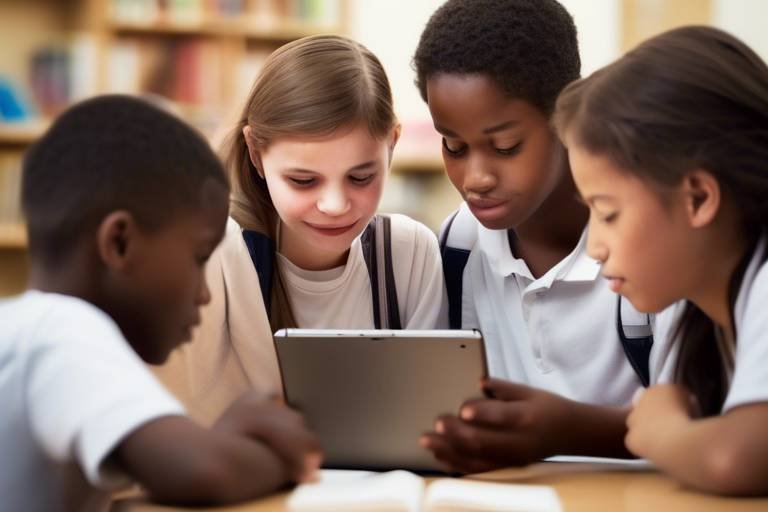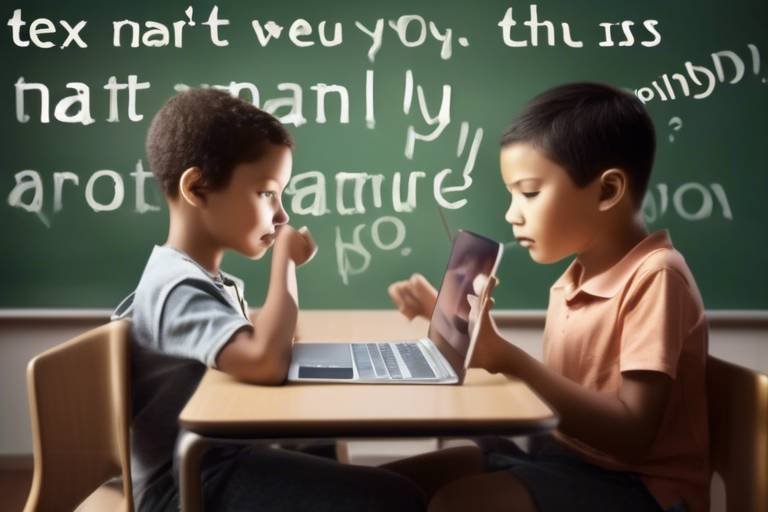The Impact of Video Games on Social Skills
Video games have become a significant part of modern culture, captivating millions of players around the globe. But have you ever stopped to think about how these digital adventures influence our social skills? It's a fascinating topic that sparks debate among parents, educators, and gamers alike. On one hand, video games can serve as a virtual playground where players learn to communicate, collaborate, and forge friendships. On the other hand, they can also lead to isolation and hinder real-life interactions. So, what’s the real impact of video games on our social skills? Let's dive in!
Believe it or not, video games can actually enhance social skills! How, you ask? Well, many games require teamwork, cooperation, and communication among players. Think of it like a digital team sport where everyone has a role to play. When players work together to achieve a common goal, they are not just having fun; they are also honing their social skills in the process. For instance, in multiplayer games, players often have to strategize, share resources, and communicate effectively to succeed. This environment fosters social interaction that can translate into real-world skills. Imagine a group of friends gathering online to tackle a challenging quest; they are not just gaming; they are building teamwork and communication skills that can benefit them in everyday life.
However, it's essential to consider the flip side. While video games can promote social interaction, excessive gaming can lead to social isolation. Picture this: a player becomes so engrossed in their virtual world that they neglect face-to-face interactions with family and friends. Over time, this can hinder their ability to communicate effectively in real life, potentially straining personal relationships. It's like being in a bubble; the more time spent gaming, the less time spent developing real-world social skills. So, while gaming can be a fantastic way to connect, moderation is key to ensuring it doesn't come at the expense of real-life interactions.
Online multiplayer games provide a vibrant platform for players to engage with others, developing crucial communication skills and teamwork. In these shared virtual spaces, players collaborate to achieve common goals, whether it's defeating a powerful enemy or building an impressive in-game structure. The beauty of multiplayer games lies in their ability to bring people together from all walks of life. They create a melting pot of cultures, ideas, and strategies. But with great interaction comes great responsibility; players must learn to navigate the complexities of online communication, which can sometimes lead to misunderstandings.
One of the most rewarding aspects of gaming is the friendships that can blossom within gaming communities. Many players find themselves forming lasting bonds with others, sharing experiences, and overcoming challenges together. These friendships often extend beyond the game, providing emotional support and a sense of belonging. Imagine connecting with someone halfway across the world over a shared love for a game; it's a beautiful example of how gaming can enhance our social networks. However, it's crucial to remember that while these online friendships can be meaningful, they should complement rather than replace real-world relationships.
Despite the numerous benefits, online interactions can present challenges. Miscommunication and conflicts are common in the digital realm, and they can significantly impact a player's ability to navigate social situations effectively. For example, the absence of non-verbal cues in text-based communication can lead to misunderstandings. Players might misinterpret a teammate's tone or intention, resulting in unnecessary conflicts. It's a bit like trying to read between the lines of a text message; without context, things can get lost in translation. Therefore, developing strong communication skills in both online and offline settings is crucial for fostering healthy relationships.
Video gaming can profoundly influence real-life relationships, either strengthening bonds through shared interests or causing strain due to excessive gaming. For many, gaming becomes a shared hobby that friends and family can enjoy together, creating opportunities for connection. However, if one partner or friend spends too much time gaming, it can lead to feelings of neglect or resentment. It's essential to strike a balance, ensuring that gaming remains a fun and engaging activity that enhances, rather than detracts from, personal relationships.
Interestingly, certain video games are designed to encourage empathy and emotional understanding. These games allow players to step into different characters' shoes, experiencing diverse perspectives and scenarios that can improve their emotional intelligence and social awareness. It's like a virtual empathy workshop where players learn to understand and relate to others' feelings.
Role-playing games (RPGs) are a prime example of how gaming can foster empathy. In RPGs, players often make choices that affect story outcomes, promoting deeper emotional connections as they navigate complex narratives and character interactions. These choices can lead to moments of joy, sadness, and everything in between, allowing players to explore the emotional landscape of their characters and, in turn, develop their understanding of human emotions.
Simulation games also play a significant role in enhancing emotional intelligence. These games often place players in scenarios that require critical thinking and an understanding of others' emotions. For instance, players might need to manage a virtual community, considering the needs and feelings of their inhabitants. This experience can translate to real-world situations, helping players relate better to others and navigate social dynamics more effectively.
- Do video games improve communication skills? Yes, many video games, especially multiplayer ones, require players to communicate effectively to succeed, thus enhancing their communication skills.
- Can excessive gaming lead to social isolation? Absolutely, while gaming can connect people, spending too much time in virtual worlds can hinder real-life interactions and lead to isolation.
- Are there games that promote emotional intelligence? Yes, role-playing and simulation games often encourage players to empathize with characters and understand complex emotional situations.

Positive Effects of Video Games
Video games are often seen as mere entertainment, but they wield a surprising power to enhance social skills. Imagine a world where players from different corners of the globe unite, collaborating to overcome challenges and achieve shared goals. This virtual camaraderie can foster a sense of teamwork and cooperation that transcends the screen. When players engage in multiplayer games, they are not just clicking buttons; they are communicating, strategizing, and building relationships. This dynamic interaction can lead to improved communication skills, as players learn to convey their thoughts and intentions clearly in high-pressure situations.
Moreover, video games can create a unique social environment where friendships blossom. Many gamers find themselves forming bonds with teammates and opponents alike, sharing experiences that can lead to lasting connections. For instance, in games like Fortnite or World of Warcraft, players often team up with individuals they have never met in real life. These interactions can lead to a supportive community, where players celebrate victories and console each other during defeats, enhancing their emotional intelligence and social networks.
In addition to building friendships, video games can also serve as a safe space for social interaction. For those who may struggle with face-to-face communication, the virtual world offers a less intimidating platform to practice their social skills. Players can engage in discussions, negotiate strategies, and even resolve conflicts—all essential components of effective communication. This practice can translate to real-life situations, equipping individuals with the confidence to engage with others outside the gaming realm.
Let's not forget the role of game mechanics in promoting social skills. Many games incorporate features that require players to work together to succeed. For example, in cooperative games, players must communicate effectively to coordinate their actions, whether it’s planning a strategy or sharing resources. This necessity for teamwork can cultivate a sense of responsibility and accountability among players, as they learn that their actions impact the group’s success.
In summary, the positive effects of video games on social skills are multifaceted. They create opportunities for communication, foster teamwork, and build friendships. As players navigate these virtual landscapes, they develop essential social skills that can enhance their interactions in the real world. With the right balance, video games can be a powerful tool for personal growth and social development.

Negative Effects of Video Games
While video games can be a source of fun and social interaction, they also come with a set of negative effects that are important to consider. One of the most significant issues is social isolation. As players immerse themselves in virtual worlds, they may find themselves spending less time engaging with friends and family in the real world. This can lead to a decline in face-to-face communication skills, which are crucial for building and maintaining personal relationships. Imagine a world where your social interactions are limited to pixels on a screen—sounds lonely, right?
Moreover, excessive gaming can lead to an unhealthy lifestyle. Many players may choose to spend countless hours in front of a screen, neglecting physical activities and outdoor experiences. This sedentary lifestyle can have detrimental effects on both physical health and mental well-being. Think about it: while you’re leveling up in a game, you might be missing out on a beautiful day outside or a fun outing with friends. The balance is key!
Another challenge that arises from video gaming is the potential for miscommunication and conflicts in online interactions. Communication in games often relies on text or voice chat, which can lead to misunderstandings. Players may misinterpret messages or tone, resulting in arguments or even toxicity within the gaming community. Such conflicts can spill over into real life, affecting how individuals communicate with others outside the gaming realm. It’s like trying to have a conversation in a crowded room—sometimes, the message just gets lost.
Furthermore, the addictive nature of video games can create a cycle of dependency. Players may prioritize gaming over important social commitments, leading to strained relationships with friends and family. Imagine your loved ones waiting for you to join them for dinner, only to find you’re glued to your gaming chair. This can foster feelings of resentment and disappointment among those who care about you, ultimately impacting your social network.
To illustrate these negative effects, consider the following table that summarizes the potential impacts of excessive gaming:
| Negative Effect | Description |
|---|---|
| Social Isolation | Reduced face-to-face interactions and connections with family and friends. |
| Unhealthy Lifestyle | Increased sedentary behavior leading to physical health issues. |
| Miscommunication | Conflicts arising from misunderstandings in online communication. |
| Dependency | Prioritizing gaming over social commitments, straining relationships. |
In conclusion, while video games offer a platform for social interaction and enjoyment, it’s crucial to recognize their potential negative impacts. Balancing gaming with real-life interactions is essential to maintain healthy relationships and develop effective communication skills. So, the next time you log in for a gaming session, ask yourself: are you connecting with others or drifting further away?
- Can video games really lead to social isolation? Yes, excessive gaming can result in players spending less time with friends and family, leading to feelings of isolation.
- How can I balance gaming with social interactions? Set specific gaming times and prioritize real-life commitments, such as family gatherings or outings with friends.
- What are some signs of video game addiction? Signs include neglecting responsibilities, feeling irritable when not playing, and prioritizing gaming over social activities.

Online Multiplayer Interactions
Online multiplayer games have revolutionized the way we interact with others, creating a vibrant virtual playground where players from all corners of the globe can connect, collaborate, and compete. Imagine stepping into a world where you can team up with a friend in New York while you’re lounging on your couch in Los Angeles, all while battling mystical creatures or solving complex puzzles together. This is the magic of multiplayer gaming! Not only does it allow for shared experiences, but it also fosters communication skills that are essential in both virtual and real-life scenarios.
When players engage in multiplayer games, they often find themselves in situations that require teamwork and strategic planning. For instance, whether you’re coordinating a raid in an MMORPG or strategizing your next move in a battle royale, effective communication becomes crucial. You learn to express your ideas clearly, listen actively to your teammates, and provide constructive feedback—all of which are vital components of social interaction. In fact, studies have shown that players who regularly engage in multiplayer games tend to develop better collaboration skills and are more adept at resolving conflicts.
Moreover, the social dynamics of online multiplayer interactions can be quite fascinating. Players often form groups or clans, creating a sense of community that extends beyond the game itself. Within these groups, players share not only their gaming experiences but also their personal lives, leading to the formation of friendships that can last for years. This bonding can provide emotional support, especially for those who may struggle with social interactions in the real world. The friendships forged in these digital realms can sometimes be as meaningful as those formed face-to-face.
However, it’s important to recognize that online interactions are not always smooth sailing. Miscommunication can occur, often due to the absence of non-verbal cues that we rely on in face-to-face conversations. Players might misinterpret a teammate's tone or intention, leading to unnecessary conflicts. For example, a simple comment meant as a joke could be taken the wrong way, resulting in frustration or even hostility within the group. Navigating these challenges can be a learning experience in itself, teaching players how to manage misunderstandings and cultivate patience.
In summary, online multiplayer interactions provide a unique platform for players to enhance their social skills while enjoying their favorite games. The blend of fun and communication not only enriches the gaming experience but also translates into real-world benefits. As players learn to collaborate and connect with others in a virtual environment, they are simultaneously building a toolkit of social skills that can help them navigate the complexities of everyday life.

Building Friendships Through Gaming
In today's digital age, the notion of friendship has evolved dramatically, and video games have become a pivotal medium for building connections. Imagine diving into a virtual world where players from all corners of the globe unite for a common purpose. This is the magic of gaming! Through shared experiences and challenges, players often find themselves forming bonds that can last a lifetime. It's not just about winning; it's about the journey taken together, the laughter shared over a difficult boss fight, or the strategic discussions that unfold during a heated match.
One of the most fascinating aspects of online gaming is the way it fosters a sense of community. Many players join guilds or clans, where they not only collaborate on missions but also engage in conversations that transcend the game itself. These interactions can lead to friendships that extend beyond the screen. Players often share personal stories, celebrate each other's achievements, and provide emotional support during tough times. In fact, many gamers report that their online friends often understand them better than those in their offline lives.
However, it’s worth noting that the friendships formed through gaming come with their own set of challenges. Miscommunication can happen easily in a text chat or voice chat, leading to misunderstandings that might strain relationships. Players might find themselves in conflicts over game strategies or differing play styles. But just like any real-life friendship, overcoming these challenges can strengthen the bond. The key is to maintain open lines of communication and approach conflicts with empathy and understanding.
To illustrate the impact of gaming on friendships, consider the following table that showcases different types of games and how they facilitate social interactions:
| Game Type | Social Interaction Benefits |
|---|---|
| Massively Multiplayer Online Games (MMOs) | Encourages teamwork and collaboration through quests and raids. |
| First-Person Shooters (FPS) | Promotes communication and strategy development among team members. |
| Role-Playing Games (RPGs) | Allows players to share narratives and experiences, fostering deeper connections. |
| Casual Games | Provides a relaxed environment for friends to connect and play together. |
Ultimately, gaming serves as a unique platform for forging friendships that might not have been possible in the real world. As players navigate challenges together, they learn to rely on each other, creating a support system that can enhance their overall gaming experience. So, the next time you log into your favorite game, remember that behind every avatar is a potential friend waiting to be discovered!
- Can online friendships be as meaningful as in-person friendships? Yes, many gamers find that online friendships can be just as meaningful and supportive as traditional friendships.
- How can I maintain friendships formed through gaming? Regular communication, playing together, and being supportive during challenges can help maintain these friendships.
- Are there any risks associated with making friends online? While many friendships are positive, it's essential to stay cautious and protect your personal information when interacting with others online.

Challenges of Online Communication
While the digital realm of online gaming opens up a world of social interaction, it is not without its challenges. One of the primary issues players face is the potential for miscommunication. In a fast-paced gaming environment, where split-second decisions can make or break a game, the nuances of verbal and non-verbal communication can easily be lost. Imagine trying to convey a complex strategy to your teammates while the clock is ticking down—it's like trying to solve a puzzle with pieces missing!
Moreover, the anonymity that online gaming provides can lead to conflicts and misunderstandings. Players might feel emboldened to express themselves in ways they wouldn't in real life, resulting in toxic behavior or heated arguments. This can create a hostile environment that not only affects gameplay but also impacts players' emotional well-being. It's like being in a crowded room where everyone is shouting, but no one is actually listening.
Another challenge is the lack of non-verbal cues. In face-to-face conversations, we rely heavily on body language, facial expressions, and tone of voice to convey meaning. However, in online interactions, especially in text chats or voice calls, these cues are often absent. This absence can lead to misunderstandings, where a simple joke might be taken seriously, or a sarcastic comment might be interpreted as genuine criticism. To illustrate this, consider a situation where a player types, “Nice job!” but in a sarcastic tone. Without the visual cues, the recipient might take it at face value, leading to unnecessary friction.
Furthermore, the fast-paced nature of many games can exacerbate these issues. Players are often focused on their performance, which can lead to a lack of attention to the team dynamics. When everyone is hyper-focused on their own gameplay, it can create a disconnect that makes it challenging to collaborate effectively. The result? A team that struggles to communicate, much like a band playing different songs without a conductor to bring them together.
In conclusion, while online gaming can foster connections and friendships, it also presents significant challenges in communication. Players must navigate the complexities of digital interactions, learning to adapt their communication styles to mitigate misunderstandings. This is an essential skill that can translate into real-world scenarios, where effective communication is key to building strong relationships. As players engage in these virtual worlds, they are not just honing their gaming skills but also their ability to communicate in a diverse range of social contexts.
- Do video games improve social skills? Yes, video games can enhance social skills by promoting teamwork and communication among players.
- Can excessive gaming lead to social isolation? Yes, while gaming can foster connections, too much time spent gaming can result in social isolation and hinder face-to-face interactions.
- How do role-playing games enhance emotional intelligence? Role-playing games encourage players to make choices that affect story outcomes, promoting empathy and understanding of others' perspectives.

Impact on Real-Life Relationships
Video gaming is a double-edged sword when it comes to real-life relationships. On one hand, it can strengthen bonds between friends and family through shared experiences and interests. Imagine sitting on the couch with your best buddy, controller in hand, working together to defeat a challenging boss. That shared triumph can create memories that last a lifetime. In fact, many players find that their gaming sessions become a ritual, a time to connect, laugh, and escape from the stresses of daily life. This can be particularly beneficial for those who might struggle with traditional social interactions, as the virtual setting can offer a more comfortable space to engage with others.
However, there’s a flip side to this coin. Excessive gaming can lead to a disconnection from reality. When hours are spent in front of a screen, it can result in neglecting face-to-face interactions with loved ones. Picture this: you’re in a heated gaming session, and your partner is trying to have a conversation with you, but your focus is entirely on the screen. Over time, this can lead to feelings of resentment or isolation from those who care about you. The balance between gaming and real-life relationships is crucial; too much of one can detract from the other.
Moreover, the nature of online gaming can sometimes complicate real-life relationships. Players may form deep connections with others online, but these relationships can lack the nuances of face-to-face interactions. For instance, online communication can lead to misunderstandings or conflicts that might not arise in person. The absence of non-verbal cues can make it challenging to gauge emotions accurately, leading to potential friction in both online and offline relationships. These challenges highlight the importance of developing effective communication skills that can bridge the gap between virtual and real-world interactions.
In summary, video games can significantly influence real-life relationships in both positive and negative ways. While they can foster connections and create lasting bonds, it's essential to maintain a healthy balance between gaming and personal interactions. By being mindful of how gaming affects our relationships, we can enjoy the benefits of gaming while nurturing the connections that matter most.
- Can video games improve social skills? Yes, video games can enhance social skills by providing opportunities for teamwork and communication.
- How can excessive gaming affect relationships? Excessive gaming can lead to neglect of face-to-face interactions, causing strain in personal relationships.
- Are online friendships as valuable as real-life friendships? Online friendships can be meaningful, but they may lack the depth and nuances of in-person relationships.
- What role do role-playing games play in developing empathy? Role-playing games often require players to make choices that affect story outcomes, promoting empathy and emotional understanding.

Video Games and Emotional Intelligence
In an age where emotional intelligence is increasingly recognized as a vital component of personal and professional success, video games have emerged as an unexpected yet powerful tool for enhancing this skill. You might be wondering, "How can something as seemingly trivial as gaming contribute to emotional growth?" Well, the answer lies in the intricate narratives and character interactions that many games offer. These experiences allow players to step into the shoes of others, navigating complex emotions and moral dilemmas that mirror real-life situations.
One of the standout genres in this regard is role-playing games (RPGs). In RPGs, players are often faced with decisions that significantly impact the storyline and the fates of various characters. This is not just about winning or losing; it's about understanding the consequences of one's actions. For example, players might have to choose between helping a character in need or pursuing their own goals. Such choices require players to think critically about the emotions of others, fostering a deeper sense of empathy. The more players engage with these narratives, the more they can develop their ability to relate to others in real life.
Moreover, simulation games provide another layer of emotional understanding. These games often place players in scenarios that demand critical thinking and emotional awareness. Imagine managing a virtual city or running a farm; players must consider the needs and emotions of their virtual inhabitants. This can translate into real-world skills, as players learn to recognize and respond to the feelings of those around them. The ability to empathize with others is crucial in building strong relationships, whether in personal life or in the workplace.
To illustrate the impact of video games on emotional intelligence, let's look at a comparison of different game genres and their potential benefits:
| Game Genre | Emotional Intelligence Skills Developed |
|---|---|
| Role-Playing Games (RPGs) | Empathy, Decision-Making, Perspective-Taking |
| Simulation Games | Critical Thinking, Emotional Awareness, Problem-Solving |
| Adventure Games | Conflict Resolution, Teamwork, Communication |
As we can see, different genres can cultivate various aspects of emotional intelligence. However, it's essential to approach gaming with balance. While video games can be a fantastic way to enhance emotional understanding, excessive gaming can lead to isolation and a detachment from real-life interactions. It's all about finding that sweet spot where gaming complements social experiences rather than replaces them.
In conclusion, video games are not merely a source of entertainment; they can be a profound medium for developing emotional intelligence. By engaging with complex narratives and making impactful decisions, players can enhance their ability to understand and empathize with others. So, the next time you dive into your favorite game, remember: you’re not just having fun; you’re also honing skills that can enrich your real-world relationships.
- Can video games really improve emotional intelligence? Yes, many video games, especially RPGs and simulations, encourage players to think critically about emotions and relationships.
- Are there specific games that are better for developing emotional intelligence? Games like "The Last of Us," "Life is Strange," and various simulation games are known for their strong narratives and emotional depth.
- How can I balance gaming with real-life social interactions? Set limits on gaming time and make a conscious effort to engage in face-to-face interactions regularly.

Role-Playing Games
Role-playing games (RPGs) are not just about leveling up or defeating a dragon; they are immersive experiences that often require players to make choices that significantly impact the story. This characteristic makes RPGs a unique medium for developing empathy and understanding complex social dynamics. When players step into the shoes of a character, they are not merely pushing buttons; they are engaging in a narrative that often forces them to consider the feelings and motivations of others. Imagine being faced with a decision that could mean life or death for a character you've grown attached to—this emotional engagement can enhance your ability to empathize with others in real life.
The narratives in RPGs often present players with moral dilemmas that challenge their values and beliefs. For instance, a player might have to choose between helping a village in distress or pursuing a personal goal. Such choices can lead to a deeper understanding of the consequences of one's actions, fostering a sense of accountability and social awareness. This is not unlike real-life situations where decisions can have far-reaching effects on relationships and communities.
Moreover, RPGs frequently include character interactions that require players to communicate and collaborate with others. These interactions can mimic real-life social scenarios, allowing players to practice their communication skills in a safe environment. Here are some key ways RPGs enhance social skills:
- Character Development: Players often create and develop characters with unique backstories and personalities, which encourages them to think critically about how different perspectives influence behavior.
- Team Dynamics: Many RPGs require players to work together to overcome challenges, promoting teamwork and collaboration.
- Conflict Resolution: Players often face conflicts within the game, whether with NPCs or other players, which can enhance their ability to navigate real-life disagreements.
In summary, role-playing games are more than just entertainment; they are powerful tools for social development. By engaging with intricate narratives and complex characters, players can cultivate empathy, improve communication skills, and better understand the social fabric that connects us all. So, the next time you dive into an RPG, remember that you are not just playing a game—you are honing skills that can translate into meaningful real-world interactions.
- Do RPGs really help improve social skills? Yes, RPGs encourage players to engage in collaborative storytelling and decision-making, which can enhance empathy and communication skills.
- Can excessive gaming negatively impact social skills? While RPGs have many benefits, excessive gaming can lead to social isolation. It's important to balance gaming with face-to-face interactions.
- Are there specific RPGs that are better for developing social skills? Many RPGs, especially those with cooperative multiplayer elements, are designed to foster teamwork and communication, making them great choices for social skill development.

Simulation Games
Simulation games are a unique genre that immerses players in realistic scenarios, allowing them to experiment with life-like situations. These games often require critical thinking and decision-making skills, which can significantly enhance players' emotional intelligence. For instance, when players navigate through complex social interactions or manage resources in a simulated environment, they learn to understand and anticipate the emotions and reactions of others. This kind of gameplay can mirror real-world situations, making it easier for players to relate to others outside the game.
One of the most fascinating aspects of simulation games is their ability to place players in roles that challenge their empathy. Whether it's managing a virtual city, running a farm, or even simulating relationships in a life simulation game, players are often faced with dilemmas that require them to consider the feelings and needs of others. This can lead to a deeper understanding of social dynamics and the impact of their decisions on those around them. For example, in games like The Sims, players must juggle the needs of their characters, which can teach them valuable lessons about compassion and responsibility.
Moreover, simulation games often encourage collaboration. Many of these games allow players to work together to achieve common goals, fostering a sense of community and teamwork. Through shared experiences, players can develop their communication skills, learning how to express their thoughts and feelings effectively. This is particularly evident in multiplayer simulation games where players must coordinate their actions to succeed, thereby enhancing their ability to collaborate and resolve conflicts. The social interactions that occur in these environments can translate into better interpersonal skills in real life.
However, it's essential to recognize that not all experiences in simulation games are positive. Just like in any social setting, players may encounter challenges such as misunderstandings or conflicts with others. These situations can serve as valuable learning opportunities, teaching players how to handle disagreements and navigate complex social landscapes. By reflecting on these interactions, players can gain insights into their behavior and improve their emotional intelligence over time.
In summary, simulation games offer a powerful platform for developing emotional intelligence and social skills. They provide players with the tools to understand and empathize with others, practice critical thinking, and foster collaboration. As players engage in these virtual worlds, they can gain insights that not only enhance their gaming experience but also enrich their real-life interactions.
- Do simulation games really help improve emotional intelligence?
Yes, simulation games can enhance emotional intelligence by placing players in scenarios where they must understand and respond to the emotions of others. - Can playing simulation games lead to social isolation?
While excessive gaming can lead to isolation, balanced gameplay can foster social interactions and friendships through shared experiences. - What are some popular simulation games that promote social skills?
Games like The Sims, Animal Crossing, and SimCity are excellent examples of simulation games that encourage empathy and collaboration.
Frequently Asked Questions
- How do video games improve social skills?
Video games can significantly enhance social skills by promoting teamwork, cooperation, and communication among players. Engaging in multiplayer games allows individuals to interact with others, fostering relationships and improving their ability to work in a team setting.
- Can excessive gaming lead to social isolation?
Yes, while video games can facilitate social interactions, excessive gaming may lead to social isolation. Spending too much time in virtual environments can hinder face-to-face communication skills, potentially straining personal relationships and impacting social development.
- What are the benefits of online multiplayer interactions?
Online multiplayer games provide a unique platform for players to engage with others. They develop essential communication skills and teamwork as players collaborate to achieve common goals, enhancing their social interaction abilities in a fun and engaging way.
- How can gaming foster friendships?
Gaming can create lasting friendships by connecting individuals through shared experiences and challenges. Many players bond over their gaming adventures, which can lead to supportive communities and friendships that extend beyond the virtual world.
- What challenges exist in online communication?
While online interactions can be beneficial, they also come with challenges such as miscommunication and conflicts. These issues can affect players' ability to navigate real-life social situations effectively, making it essential to develop good communication skills both online and offline.
- How do video games influence real-life relationships?
Video games can impact real-life relationships in various ways. They may strengthen bonds through shared interests or create tension if one partner spends excessive time gaming instead of engaging in face-to-face interactions, highlighting the importance of balance.
- What role do video games play in developing emotional intelligence?
Certain video games can encourage empathy and emotional understanding by allowing players to experience different perspectives. Engaging with complex narratives and character interactions can enhance players' emotional intelligence and social awareness.
- How do role-playing games promote empathy?
Role-playing games (RPGs) often require players to make choices that affect story outcomes. This decision-making process promotes empathy as players navigate complex narratives and consider the feelings and motivations of various characters.
- What benefits do simulation games offer in terms of emotional intelligence?
Simulation games can help players develop emotional intelligence by placing them in scenarios that require critical thinking and an understanding of others' emotions. This experience enhances their ability to relate to real-world situations and improve their social interactions.



















